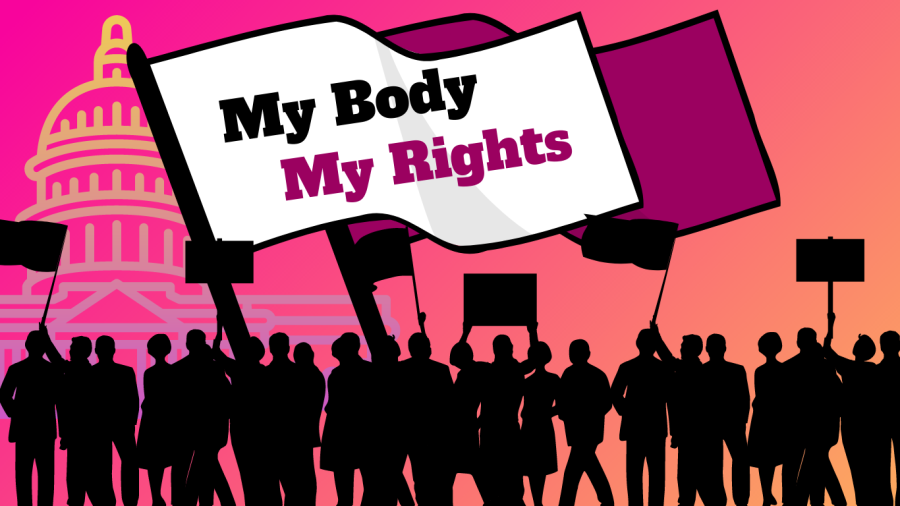OPINION: Protect our right to abortion
The time to fight for Roe v. Wade is now
It is time to take a long, hard look at who we want to be holding legislative power over women’s bodies.
February 3, 2022
Abortion and reproductive rights are essential healthcare for all people. No state or court should restrict women’s freedom to choose what to do with their own bodies.
Jan. 22 was the 49th anniversary of Roe v. Wade, a landmark court case in which the Supreme Court determined that states’ restrictions on abortions were unconstitutional and that it is protected by the Fourth Amendment.
That precedent changed in September 2021 with the Texas abortion law, SB-8.
The law was signed by Texas Gov. Greg Abbott in May 2019 and is in complete opposition to Roe vs. Wade. It was officially put into effect on Sept. 1, 2021 and, among other things, banned abortions after six weeks of pregnancy.
There are no exceptions for victims of rape or incest.
The law also says that anyone who intends to aid in or perform an abortion after the six-week period will be penalized.
“The legislation allows anyone, anywhere, to sue people involved in providing abortion care or practical support to patients in Texas, and win judgments of $10,000 or more,” Paul Dillon, vice president of public affairs for Planned Parenthood of Greater Washington and North Idaho, wrote in an email.
According to Dillon, this would create a large number of unnecessary lawsuits and ultimately hurt abortion clinics.
This decision is in an effort to bypass court challenges on the constitutionality of anti-abortion legislation by putting (undue) power into the hands of civilians.
As for the Supreme Court, putting hope into the system appears to be unreliable. After being challenged by the Justice Court, the law was deemed constitutional with an 8-1 vote.
A slew of demonstrations from both sides erupted immediately after SB-8 was put into place. Even today, abortion clinics continue to be targeted by anti-abortion extremists, and the unrest between both sides is at a peak.
The debate reaches all the way to WSU. Last semester an altercation between pro-life and pro-choice protestors arose outside the Compton Union Building. WSU alum Hannah Lindenau was at the scene fighting for the pro-choice argument, waving a sign that read “Mind your own uterus.”
“The Texas abortion ban won’t stop abortions; it will only stop safe abortions,” she said.
Restrictive abortion laws force women to turn to potentially harmful alternatives that can leave them dead – or wanting to be.
An estimated 68,000 women die every year due to unsafe abortions, according to the World Health Organization. Access to care is limited in restrictive states, leading many to travel up to 100 miles out of state to receive an abortion.
“If the U.S. Supreme Court overturns Roe vs. Wade, we anticipate the number of out-of-state patients to dramatically increase,” Dillon wrote. “The potential increase in patients could also put a strain on our clinics. The Guttmacher Institute estimates that if Roe is overturned, demand for abortion in Washington will increase by 385 %.”
Pro-life advocates demonstrated once again in front of the CUB last Monday, Jan. 24. When Kylie Lockington, junior wildlife ecology and conservation science major, and junior marketing major Megan Sweeney saw what was happening, they immediately ran to protest it.
Both said they wish that there had been some warning about the demonstration beforehand for the sake of those who may be triggered or traumatized by the protestors’ imagery.
“I think WSU should at least send out an alert that there are people out here showing these extremely disturbing images,” Sweeney said.
Lockington also expressed concern regarding the scientific legitimacy of the protest.
“It’s literally false medical information. I don’t know how that’s not fucking illegal, like what is that?” Lockington said.
Dillon wrote that extremists opposed to abortion often promote harmful misinformation about abortion practices.
Luckily, protests are not just happening within college communities. There are also figures at the national level who are outspoken about the law’s lack of a realistic timeline for women.
New York Rep. Alexandria Ocasio-Cortez has publicly pointed out the scientific fault in the law, as well as reproductive restrictions in general.
“‘6 weeks pregnant’ = 2 weeks late on your period,” Ocasio-Cortez wrote in a tweet.
She also said that multiple factors can play into a late menstrual cycle other than pregnancy, such as a change in diet or stress level.
How is this two-week period enough time for a woman to decide if carrying a child is a feasible option for her?
What if she does not even realize she has missed her period?
How are two weeks enough for women to figure out the financial aspects of abortion care while juggling everyday expenses?
There are too many questions in this six-week gap that give power to lawmakers and take it away from individuals who would be the ones actually to carry and care for these children.
This mere two-week window is also extremely damaging to victims of rape or incest who may need to seek an abortion, as the trauma of their assault compounds the trauma of making such a decision in this short time. In a press conference in September 2021, Abbott failed to acknowledge these victims by only focusing on the offenders.
Abbott said he plans to “… work tirelessly to make sure we eliminate all rapists from the streets of Texas by aggressively going out and arresting them.”
This logic is flawed in two ways: It fails to acknowledge a society that is still struggling to penalize sexual assault perpetrators while also continuing to perpetuate a culture of victim-blaming – if the victim reports their assault at all.
Only about 310 sexual assault cases out of 1,000 are reported to the police, according to the Rape, Abuse, and Incest National Network. Of those who do get reported, only 25 out of 1,000 are incarcerated.
These numbers do not give me hope that a governor’s plan to “eliminate rapists” will be enough to change a societal norm of victim-blaming and fear-based silence.
If the assault has created a pregnancy for the victim, how is simply arresting their rapist fixing the issue? Abbott’s plan of “arresting them” will do no more than inconvenience the offender with jail time.
If other states implement abortion restrictions, how will they handle this same issue?
“It sets a precedent, it’s just testing the limits and seeing how far they can get, and once they see that they can just manipulate the system and get what they want, they are going to keep doing that,” Lockington said.
There are 26 other conservative states predicted to follow in Texas’ footsteps.
“If other states did the same, the consequences would be enormous,” Dillon wrote. “One of the biggest impacts would be that any patient unable to get an abortion in the state they live would have to travel considerably farther for services.”
The Texas law seems to be a catalyst for Republican states to feel free to make laws that control women’s bodies, as they now know how to get around the law being unconstitutional in court.
South Dakota Gov. Kristi Noem announced two new bills last week that is said to be a direct takeaway from the Texas abortion law.
Now that other states are willing to follow in Texas’ footsteps, digging into Abbott’s original reasoning for the bill is important to see how laws stemming from his thinking are deadly.
“It’s crazy to see how far we were able to come, and it just takes one thing, and we are right back to the beginning,” Sweeney said. “What’s all the work we did for? I don’t understand how that could have happened.”
This law does not just affect individuals – our government’s impediment to personal choice is influencing the success of our society.
Having the freedom to choose if and when to have a baby is closely connected to the overall economic success of women, according to a report by the Center of American Progress.
Women are an irreplaceable part of the American workforce, and the impact of restricting their bodily autonomy could be catastrophic to our economy.
“The threat to abortion access has never been more urgent: with patients across the country poised to lose access to abortion in the coming months, our top priority this year will be to solidify abortion access and funding in our state,” Dillon wrote.
One way WSU students specifically can get involved and help protect access to safe abortion is by joining the upcoming campus chapter of Generation Action, a club affiliated with Planned Parenthood.
When will we stop letting authoritarian politicians control our futures and take back power over our own bodies?
Now is the time.
















